I’m *that* friend. The one that never shows up to stuff. Or the one that promises she will, but pulls out at the last minute. It’s not that I don’t want to come. It’s that I can’t. And I hate it.
I know that friendship isn’t predicated on how many brunch dates you have a month or how often you go for an after work drink or how many times you pop by their house and hang out with their kids and/or animals. But it sure can feel like it is. And as someone who can’t really do much of any of those things, I sometimes feel like I’m a pretty dismal friend.
Which is not only untrue, it’s unfair to anyone else in my situation, because I certainly would never say that they were a dismal friend. And yet, I can’t help but beat myself up over this.
The basic truth is this: friendship and fatigue don’t mix. They’re not bros. Friendship isn’t hanging out waiting to take fatigue for lunch, mainly because fatigue probably isn’t out of bed yet.
And unfortunately, fatigue isn’t the only thing stopping me from getting out of the gate. Pain is its constant companion. Then there’s anxiety and depression, which are every bit as physically debilitating as the first two.
I’ve been reading Tara Hardy’s book of poems My, My, My, My, My, which is extremely emotional for me. Hardy has Lyme Disease and writes about her experiences of chronic pain and illness, as well as things like being treated with chemotherapy, and the impact being sick has on mental health. (Warning if you’re going to get a copy, there is also graphic recount of her experiences of childhood sexual abuse).
I first came across Hardy’s work when I read this excerpt, and I knew I had to get the book.
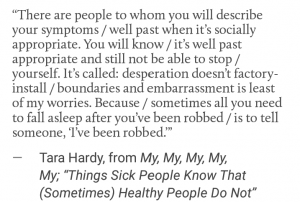
It’s hard to quantify what it hits like in your guts when someone writes down exactly your own experience of something. I talk to a lot of people about being chronically ill, I talk to a lot of people who are also chronically ill, we have a lot of moments of understanding. But there’s something about this being poetry, which is so emotional in the first place, and it being a language I understand, being a poet myself, that… it’s kind of killing me, at the exact same time as breathing life directly into my lungs. It’s this moment of “Oh my god, someone gets it. Someone knows. It’s not just me.”
I feel like I could get carried away and share the entire book here but I will restrain myself and go with just two that illustrate what I’m saying about friendship and chronic illness.
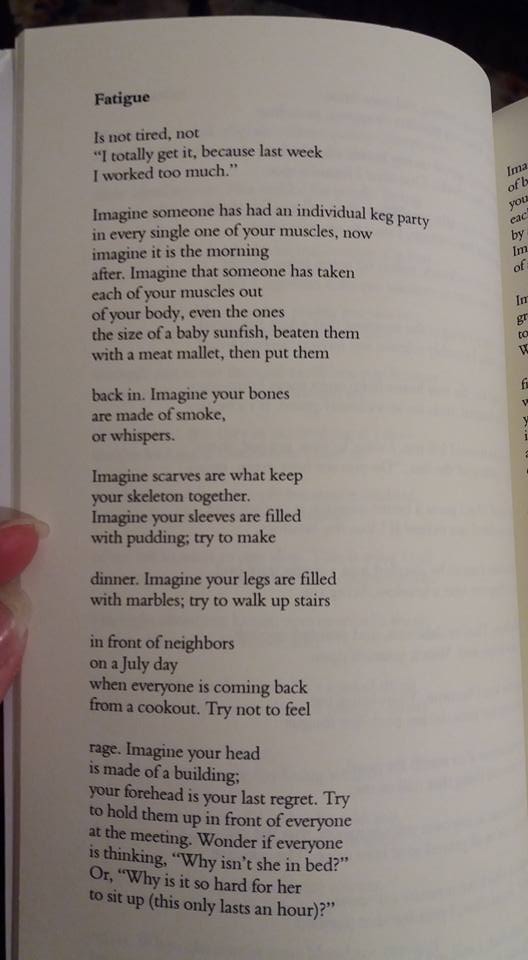
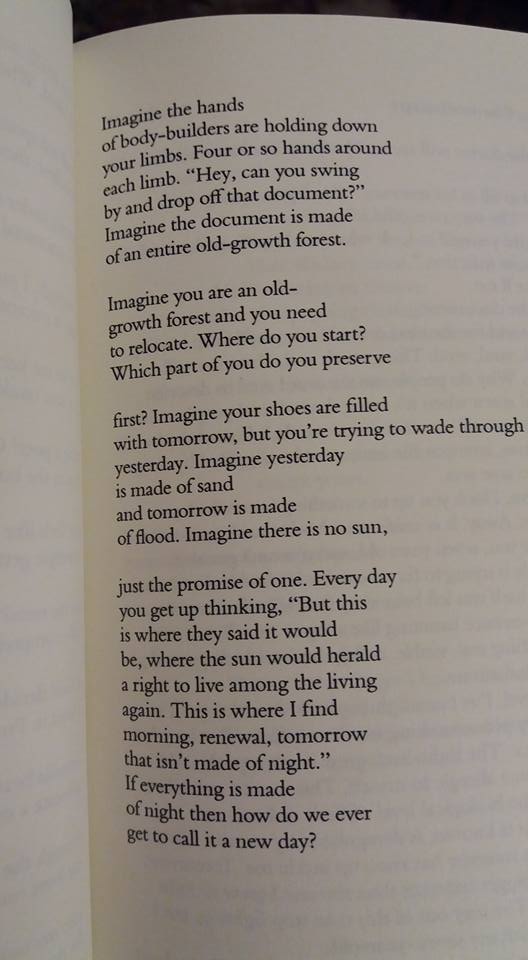
If you’ve ever wondered how I feel on a daily basis… that might answer the question. This is not an exaggeration. I wish to god it was.
This next one is about dating but I think it can be apply to friendship too.
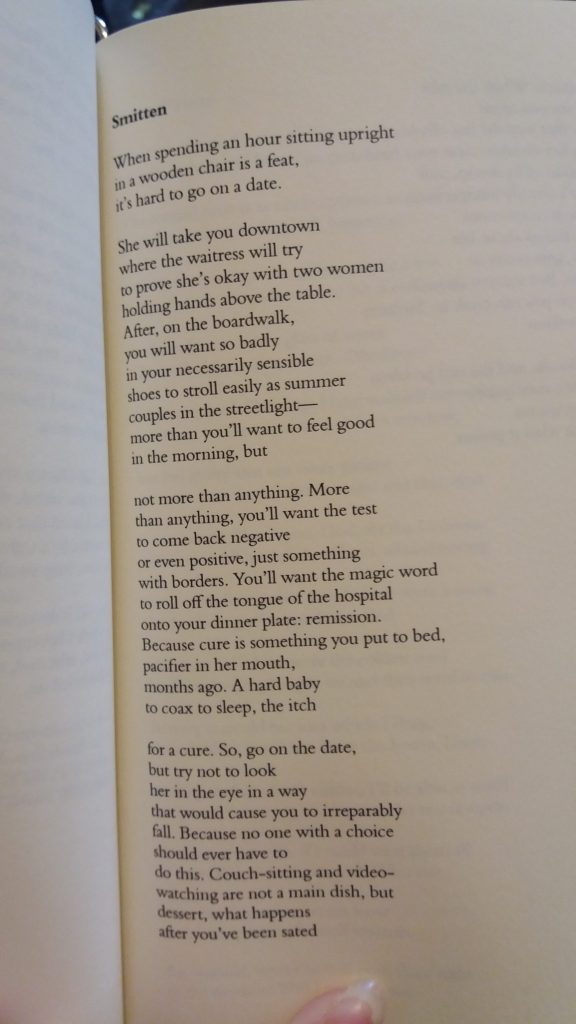
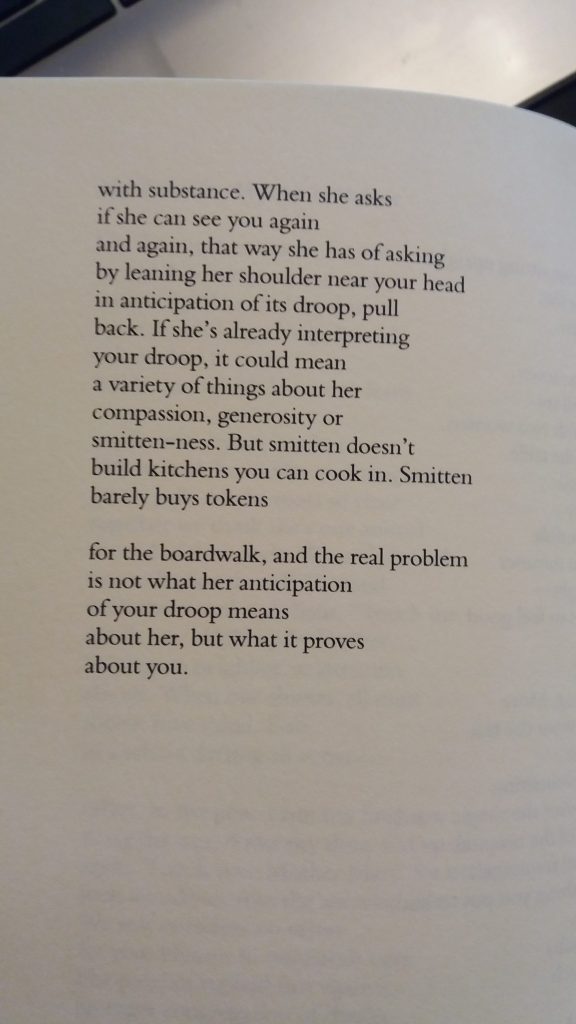
I cried after I read that. Because it does – it does prove something about me. It proves that I’m sick, and that I am always going to need people to lean on, and how that is the most difficult reality to accept. I want to be the person who is there for others.
But when my health is at it’s worst is when I need my friends the most – and when I feel terrible for that, because I can offer so little in return.
However…. all those things – brunches, lunches, wine dates – aren’t actually truly important. They don’t define friendship. What is important is compassion, patience, making allowances – genuinely appreciating each other, no matter what form that might take.
For me, those forms look smaller. I might not be able to come to your party – but I will phone you. I won’t be able to drink with you – but I’ll eat chocolate with you til we’re nauseous. I can’t visit all the time – but I can write you letters. These things look small – but they take just as much energy out of me as going to out for dinner might take out of a healthy person. So it’s important to remember, I guess, that I am doing everything I can to show you how much I care.
Do you have a friend who’s chronically ill?
Hopefully articles like this help you understand what life is like for them. The best thing you can do, however, is ask. Ask them how they’re feeling, what they want from you, what they want to give. There’s nothing beats information from the person themselves.
Having said that, here’s a couple things to keep in mind. To recap:
- Being a friend when you have a chronic illness that kind of rules your life is really fucking hard. We don’t want it to be that way, but that’s how it is. We will never intentionally neglect you. You just might need to remember that we can’t do all the same things, to the same level, that a healthy person can – or at least, not as easily.
- If you feel like your friend is getting isolated – reach in. As a chronically ill person with both physical and mental health challenges, I’ve written before about how hard it can be to reach out. Sometimes, I just don’t have that capacity. A text from you could make far more of a difference than you can even imagine, because that small bit of communication is difficult for us. When I’m as fatigued as that poem describes, sending a text can feel like jogging the length of a rugby field. Which means I appreciate getting them so much more. They’re like tiny diamonds in my day.
- Fatigue means fatigue. It means I can’t roll over in bed – so I’m not going to be going out for dinner any time soon. Do you have any idea of the steps involved in going out for dinner? Standing up in the shower, reaching up to wash your hair, reaching up to dry your hair, attempting makeup, attempting jewelery, trying on a couple outfits, taking them off again, wearing heels, calling a cab, sitting on a hard wooden chair, making conversation, choosing a meal that hopefully won’t set off all my inflammation, eating the meal, getting home again, getting undressed ohmygodI’mexhausted. I’m exhausted just thinking about it. I used to take all of those things for granted, I never thought twice about them. Now, someone suggests dinner and something inside me dies. Because I know the possibility of me doing it is so low, and I know I’m going to miss out, and even if I get to go, it’ll be because I push myself and I take more medication than is wise and I spend the next week paying for it. So please understand. It’s not that we don’t want to go to dinner. It’s that we can’t.
- Finally, and this is vital: please don’t give up on us. Yes, we probably can’t go to dinner. But you know what’s worse than never going? ….Never getting invited. That sucks. That’s it’s own special kind of pain. So even though we’ll probably say no, please please keep making suggestions. Even better if you say something like “We’re going for dinner Friday. I know you probably can’t, but I wanted to let you know you’re invited. What about we do coffee at your place on Sunday? I’ll fill you in on any gossip.” That tells us you appreciate us and want us around, that you’re not putting any pressure on us, and that you’re willing to do what works for us to stay in contact. It might not be perfect – but if you’re a healthy person, it’s going to be a hell of a lot easier for you to visit someone at home than it might be for them to go out.
- Thanks for making it this far. Both with this blog, and with me. I am deeply, massively, unquantifiably grateful to my friends. There’s not enough chocolate in the world to show it. I’m so lucky to have you. I hope you know it.
